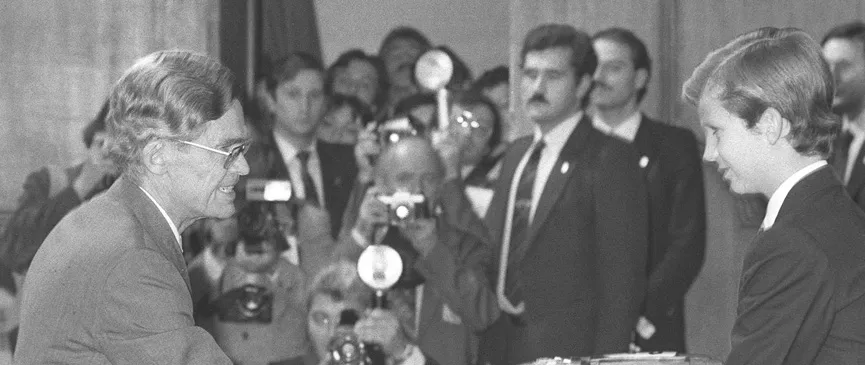Contenido principal
Mario Bunge Premio Príncipe de Asturias for Communication and Humanities 1982

Physicist and Philosopher, Mario Augusto Bunge (Buenos Aires, Argentina, 1919 - Montreal, Canadá, 2020), is the author of an abundant philosophical output, particularly in the field of the Methodology and Philosophy of Science. Of a German family related to Spaniards originating from the Basque Country and Asturias, he received a humanistic and philosophical type of education, based on reading the classics of literature, as well as authors such as Hegel, Marx, Freud and Russell, from whom he would later distance himself critically.
From eighteen years of age he studied Physics and Mathematics at the National University of La Plata, gaining his doctorate in 1952 in Physical and Mathematical Science. Motivated by the epistemogical problems presented by the new physics, he specialised in the fundaments of physics and epsitemology.Co-founder in 1944 of the prestigious Argentinian Physics Association, his university career was cut short due to his ethical and political commitments. After the fall of Perón he was reinstated at the University of Buenos Aires and named professor of Theoretical Physics and Philosophy of Science. He left his country in 1963 and went to North American and German universties, finally settling in 1966 in the McGill University of Montreal, Canada, where he holds the prestigious Frothingham chair. He was also a visiting lecturer at the Autonomous National University of Mexico, and the Universities of Aarhus, Geneva and Freiburg (Switzerland) and the Polytechnic of Zurich.
His interest in philosophy, which was awakened at the age of sixteen, has always been kept alive, even during his wilderness years. Founder of the philosophy journal Minerva (1944-45), he was co-founder of the Rio Plate Association of Logic and Scientific Philosophy (1956), of which he was president. He burst upon the field of the Theory of Science as a writer in 1959 with his resounding work Casuality: The Place of the Causal Principal in Modern Science, translated into seven languages, in which he defends a widened principle of determinism in modern science. Humbolt Grant holder at the Univerity of Freiburg, titular member of the Académie Internationale de Philosophie des Sciencies and of the Institut Internationale de Philosophie, he published in 1967 his all-embracing treatise on he theory of Science, Scientific Research, whose translation into Spanish, La investigación científica was not long in coming (1969), and whose repercussions among the scholars of philosophy and science is well-known.
Among his works in Spanish, we could mention Teoría y realidad, Filosofía de la física, Epistemología, Materialismo y ciencia, El problema mente-cerebro, Economía y filosofía, Filosofía de la psicología (in cooperation with R. Ardilla) and Mente y sociedad.
Between 1969 and 1989 Bunge worked on the construction of a philosophical system covering ontology, semantics, the theory of knowledge, the philosophy of science and technology, the theory of values and ethics. He has promulgated his system in his Treatise on Basic Philosophy, in 8 volumes (1974-1989). Making use of rigorous formal methods, he has tackled prickly questions, both modern adn traditional. The said trestise has been the subject of some thirty critical studies published in 1990 under the title Studies on Mario Bunge's Treatise. Another volume of tributes, Scientific Philosophy Today: Essays in Honour of Mario Bunge, appeared in 1982. In 1989, the psychologist Raúl Serroni Copello published a book titled Encuentros con Mario Bunge.
Apartt from his huge written work, Bunge's active participation in congresses, lectures and seminars all over the world is noteworthy. He founded the Society for Exact Philosophy (1971) and the Asociación Mexicana de Epistemología (1976). He wrote for numerous journals and group works, and was general editor of the collections Exact Philosophy, Epsiteme, Ciencia de la ciencia and Methods.
Fin del contenido principal
